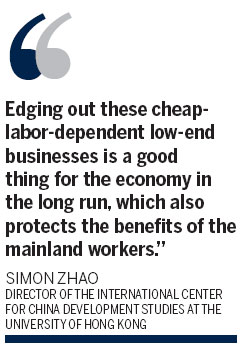Weighing wages on the scales of progress
Updated: 2010-06-24 07:03
By Li Tao(HK Edition)
|
|||||||||
Hong Kong businessman Peter Lam used to run a toy factory in Dongguan, an important industrial city in neighboring Guangdong province that is a foreign capital magnet. After 10 years' dedication to the business he is familiar with, Lam nevertheless decided to quit, as he found it was no longer easy to find cheap labor.
"It was tough," said Lam. "Competition was fierce and my profit margin was diminishing. The pool of low-cost labor shrank so fast that I could no longer recruit enough eligible workers at the wages I used to pay."
While some small businesses are struggling with a labor shortage, big factories are under mounting wage inflation pressure, after the breakout of several walkouts on the mainland.

Japan's Toyota, the world's largest automaker, last Thursday confirmed production has resumed after the company agreed to discuss wage increases with workers who went on strike at an assembly plant in Tianjin two days earlier.
It followed disruptions in the production of another Japanese automaker, Honda, which has agreed to raise wages 24 percent for workers at a parts plant in Foshan, Guangdong, after all its mainland production halted due to pay-related walkouts.
The world's largest contract manufacturer of electronics, Foxconn Technology Group, even doubled every employee's basic salary after a spate of worker suicides in its Shenzhen factories, which triggered public outrage regarding the mainland's "sweatshop" conditions.
"Factories on the mainland can no longer avoid rising labor costs, as wage increases, particularly among the long underpaid groups, are both urgent and necessary," Simon Zhao, director of the International Center for China Development Studies at the University of Hong Kong, told China Daily.
The enormous labor pool out there, according to Zhao, has long stifled wages on the mainland, which has resulted in significant disprities between wage progress and economic growth.
Official figures show that mainland urban residents' disposable income grew at an average 7.2 percent per year since economic reform began three decades ago, and rural residents' income grew by 7.1 percent, both lower than the average GDP growth rate of 8-11 percent since 2001, while tax revenues have been growing at a rate of above 20 percent in recent years.
Minimum wages across the nation have also risen slowly. Guangdong province is an instructive example: As of May 1 and after several adjustments over time, the minimum monthly wage was only 1,030 yuan in Guangzhou, 920 yuan in Dongguan, and 810 yuan in Shantou.
Shanghai adjusted upward its minimum wage by 16.7 percent this April, the highest on the mainland currently, which nevertheless stands at merely 1,120 yuan per month.
Zhao said his research, which comprises comparative studies of labor income across similar professions in different countries, showed that mainland workers are also paid at low-levels compared with their counterparts in other developing countries.
"Mainland skilled workers are paid only 5 percent of what American workers receive, about half of what workers in Indonesia and Malaysia earn, and only slightly more than what Vietnamese workers are paid," said Zhao.
Zhao said temporary difficulties in some factories will be inevitable as rising labor costs will further eat into their thin profit margins. But he believes wage inflation "will not necessarily put them to an end," as "those with advanced technologies and high productivities will have the bargaining power to transfer the costs to the buyers."
"Edging out these cheap-labor-dependent low-end businesses is a good thing for the economy in the long run, which also protects the benefits of the mainland workers," Zhao added.
Pansy Yau, deputy chief economist of the Hong Kong Trade and Development Council (HKTDC) holds a similar view. Yau said a survey carried out by the council indicates that the mainland's competitiveness as a production base will not be hampered by wage inflation, as its advantages are not due to price alone.
"Despite rising production costs, the mainland's share of manufactured exports in world trade continues to increase, from 4.7 percent in 2000 to 12.7 percent in 2008, which emphasized that the competitiveness of the mainland as a production base is not linked to prices alone," Yau said, adding that the mainland's well-established industrial clusters, highly efficient and skilled labor force and infrastructure systems are able to offset the disadvantage of rising costs associated with wage increases.
The survey, which interviewed over 4,500 manufactures across the Pearl River Delta (PRD) region, also indicated that over 53 percent of respondents in the second quarter of this year said they can pass at least part of the rising labor costs to overseas buyers. Only 43 percent showed the same confidence in the first quarter.
"The PRD region went from a surplus to a shortage of workers over the years - currently a 50 percent shortfall in experienced workers. A higher wage is necessary to ensure the labor supply in the region," HKTDC's senior economist Billy Wong observed, as he commented on the survey.
"The mainland definitely needs to transform the economic model from relying on low-cost labor to developing higher value-added and sophisticated products," said Wong.
China Daily
(HK Edition 06/24/2010 page3)